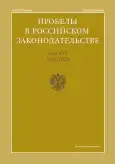Prospects for the Use of Unmanned Aircraft by Police Employees when Performing Official Tasks
- Authors: Tsvetov S.V.1, Chaplygin N.N.1
-
Affiliations:
- Belgorod Law Institute of the Ministry of Internal Affairs of Russia named after I.D. Putilin
- Issue: Vol 16, No 8 (2023)
- Pages: 90-94
- Section: Public Law (State Law) Sciences
- URL: https://journal-vniispk.ru/2072-3164/article/view/251401
- EDN: https://elibrary.ru/OWLDWU
- ID: 251401
Cite item
Abstract
The purpose of the research. The article reveals positive aspects indicating the relevance and necessity of the use of unmanned aerial vehicles (hereinafter referred to as UAVs, drones) by police officers. The legal basis for countering enemy aircraft is determined, and arguments are made in favor of the use of drones in the official activities of internal affairs officers, including when performing official tasks in special conditions. Results. The provisions set out in the article indicated the importance of considering the issues of forming units whose area of interest is the control of UAVs and the performance of tasks associated with a high degree of risk to the life and health of law enforcement officers.
Full Text
##article.viewOnOriginalSite##About the authors
Sergey V. Tsvetov
Belgorod Law Institute of the Ministry of Internal Affairs of Russia named after I.D. Putilin
Author for correspondence.
Email: tsvetov-86@mail.ru
Scopus Author ID: 7030-7407
Senior Lecturer at the Department of Tactical and Special Training
Russian Federation, BelgorodNikolay N. Chaplygin
Belgorod Law Institute of the Ministry of Internal Affairs of Russia named after I.D. Putilin
Email: niko-chap@yandex.ru
Scopus Author ID: 6372-8314
Senior Lecturer at the Department of Tactical and Special Training
Russian Federation, BelgorodReferences
- Kezhov A.A., Grachev Yu.A., Stepanov I.V. Organizational and legal support of unmanned complexes in the system of the Ministry of Internal Affairs of Russia//Bulletin of St. Petersburg University of the Ministry of Internal Affairs of Russia. 2016. № 3 (71). P. 40-43.
- Moiseev N.A., Novoselov N.G. On the use of unmanned aerial vehicles in operational search activities//Bulletin of the Far Eastern Law Institute of the Ministry of Internal Affairs of Russia. 2019. № 1 (46). P. 125-130.
- Petrov I.V. The problem of the system of basic concepts and terms in the field of security and operational-search activities//Military Law Journal. 2011. № 11. S. 14-18.
- Fetisov V. S. Unmanned aviation: terminology, classification, modern state/V. S. Fetisov, L. M. Neugodnikova, V. V. Adamovsky, R. A. Krasnoperov. - Ufa: PHOTON, 2014. - 217 pp.
- Kosovo V. B., Martynyuk S. N. Actual issues of practical use of unmanned vehicles in the Internal Affairs Bodies of the Russian Federation. Society: politics, economics, law. 2020 NO. 3 (80), S. 25-29. doi: 10.24158/pep.2020.3.4.
- Shubakin A.A. Features of service by officers of the police patrol service in public places in the event of a threat of UAVs. Law and governance. 2023 NO. 10 Pp. 36-43. doi: 10.24412/2224-9133-2023-10-36-43.
- Shepel N.V., Klokov E.A. Collection of materials from forensic readings. 2021. №18. Pp. 85-86.
- Sources:Publication of the Federal Assembly of the Russian Federation “Parliamentary Newspaper” // [Electronic resource]. URL: https://www.pnp.ru/social/kolichestvo-kiberprestupleniy-v-rossii-vyroslo-na-tret (date of access: 11/30/2023).
- Sources:Constitution of the Russian Federation. Adopted by popular vote on December 12, 1993 (taking into account amendments to laws No. 6 - FKZ and No. 7 - FKZ of December 30, 2008) // Russian newspaper. - 1993. - December 25; Russian newspaper. - 2009. - January 21.
- Sources:Military-industrial complex news. Interest in the use of UAVs in the Ministry of Internal Affairs system is constantly increasing // [Electronic resource] URL: https://vpk.name/news/13599_interes_k_primeneniyu_bla_v_sisteme_mvd_postoyanno_vozrastaet (access date: 11/30/2023).
- Sources:Official website of the Ministry of Internal Affairs of Russia // [Electronic resource]. URL: https://belui.mvd.rf/Press-sluzhba/Novosti/item/37607853 (access date: 11/30/2023).
- Sources:Order of the Ministry of Internal Affairs of Russia dated April 30, 2020 No. 252 “On approval of the Procedure for making a decision to suppress the presence of unmanned aircraft in airspace in order to protect the life, health and property of citizens above the venue of a public (mass) event and the adjacent territory, holding urgent investigative actions and operational investigative measures and the List of officials authorized to make such a decision” // “Official Internet portal of legal information” (www.pravo.gov.ru), 12.28.2018, No. 53207.
- Sources:Federal Law dated 02/07/2011 No. 3-FZ “On the Police” // published in the Collection of Legislation of the Russian Federation dated February 14, 2011 No. 7 Art. 900.
Supplementary files








